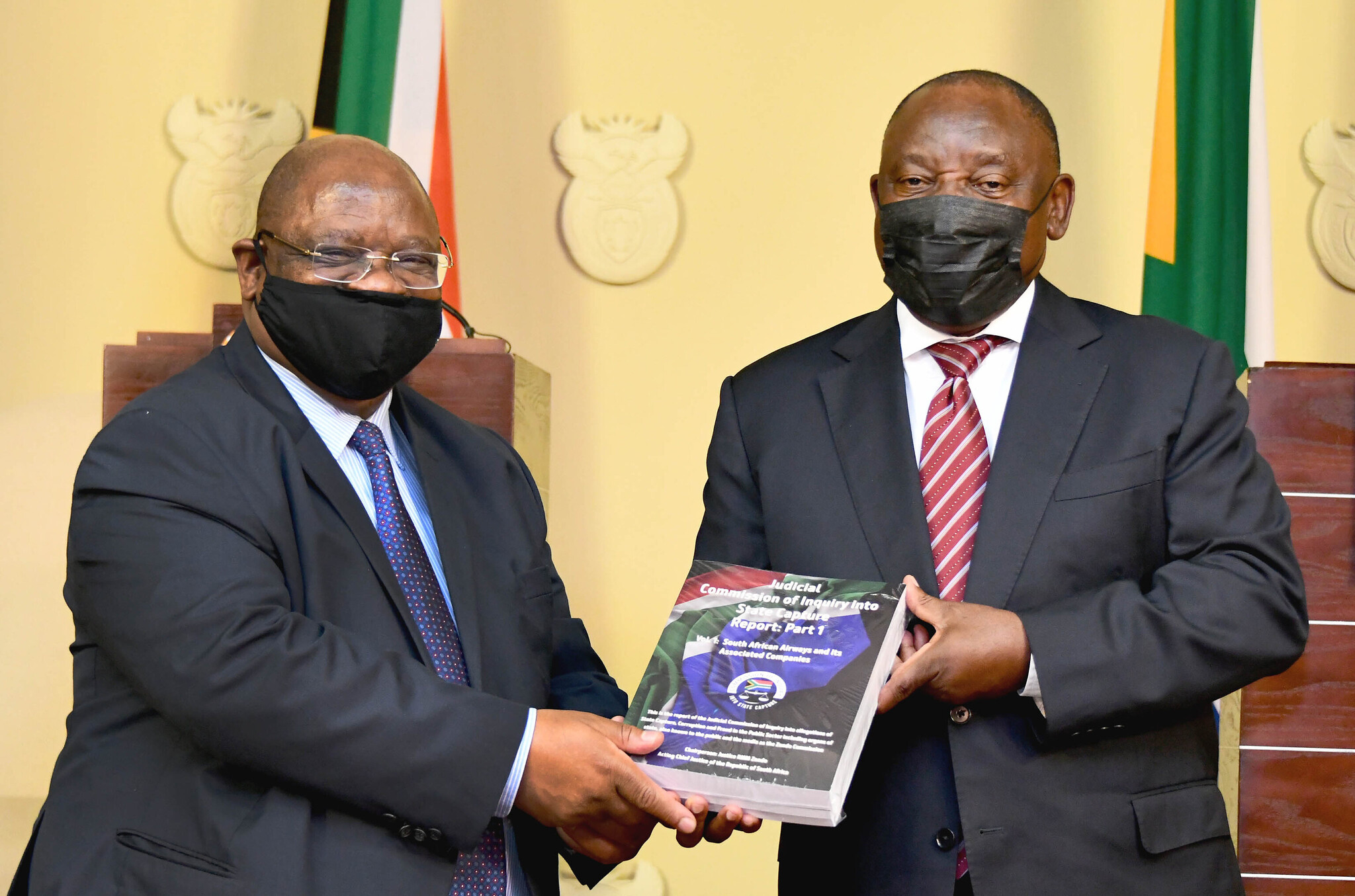Part three of the Zondo Commission's report deals with how Bosasa used gifts and cash to influence ANC heavyweights.

Chief Justice Raymond Zondo hands part three of the state capture report to President Cyril Ramaphosa. Photo: Flickr/GCIS
“Corruption was central to Bosasa’s business model” and ANC bigshots including former president Jacob Zuma, Gwede Mantashe, Nomvula Mokonyane and Thabang Makwetla saw nothing wrong with enjoying the spoils of the corrupt relationship between the company and the state.
In the latest installment of the Commission of Inquiry into Allegations of State Capture’s reports, Acting Chief Justice Raymond Zondo comes to the conclusion that “Bosasa (and the Watson family) established a reasonably well-organised network of well-placed, well-connected and powerful people whose loyalty was secured with financial and other material incentives and bribes”.
He bases this on the testimony of the infamous Angelo Agrizzi and other witnesses, who demonstrated that the company used their access to ANC higher-ups to “promote and protect the private interests of Bosasa by irregular procurement and practices to extract money from the state in very substantial amounts”.
The Presidency released the third part of the report of the Judicial Commission of Inquiry into Allegations of State Capture, Corruption and Fraud in the Public Sector on Tuesday evening, after it was presented to the Director-General in the Presidency, Phindile Baleni, by the Secretary of the Commission, Itumeleng Mosala.
Zondo recommends that Zuma, Mantashe, Mokonyane and others be investigated for corruption related to the awarding of contracts to Bosasa by multiple government departments, SOEs and other entities.
The report found that members of the national executive and other state functionaries influenced the awarding of tenders to benefit not only themselves, but also “their families or entities in which they held a personal interest”.
The former president allegedly benefitted in the form of sponsored, lavish birthday parties and monthly payments of R300,000 into his Jacob G Zuma Foundation, which according to the report amounted to a breach of his constitutional obligations as president.
ALSO READ: Agrizzi testifies about Dudu Myeni and Zuma’s role in Bosasa fracking deal
In return for the company’s generosity, Zuma allegedly interfered in government departments’ plans to cancel Bosasa contracts.
Former minister Nomvula Mokonyane is also on the receiving end of scathing criticism from Zondo for her acceptance of gratuities from Bosasa, with recommendations that law enforcement act against her for corruption.
The report says “there were clearly extensive attempts by Bosasa and its leaders, through various forms of inducement and gain, to influence Ms Mokonyane in her position as a member of the national executive, the provincial executive and office bearer in organs of state”.
ALSO READ: WATCH: Mokonyane’s personal assistant to take stage at Zondo commission
Mokonyane apparently benefitted in the form of monthly payments of R50,000 and paying for her 40th birthday party.
Former ANC secretary-general and current Minister of Mineral Resources and Energy Gwede Mantashe also benefitted from Bosasa’s corrupt business model, in the form of CCTV cameras at his homes in Boksburg and Cala in the Eastern Cape.
Similarly, deputy defence minister Thabang Makwetla received a security system for his home, and after this gift was made public, ended up paying a massively discounted R25,000 for the R90,000 system.
The report also recommends that he be investigated.
ANC MP and Parliament’s house chairperson Cedrick Frolick should also be investigated for corruption, according to the report, for his alleged acceptance of cash payments in exchange for setting up a meeting between the company and former ANC MP Vincent Smith.
Smith allegedly facilitated several contracts for Bosasa, in his former role as chairperson of Parliament’s correctional services portfolio committee, in exchange for millions in cash and payment for his daughter’s tuition.
ALSO READ: Ex-ANC MP Vincent Smith’s fraud, corruption case postponed to April
Smith, along with Agrizzi, are already facing criminal charges in connection with these alleged payments.
The report found that the use of Bosasa’s Krugersdorp offices as a “war room” for the ANC’s 2014 election campaign amounted to an unacceptable benefit to the governing party.
It recommends that the ANC officials behind this deal, as well as former Bosasa directors Papa Leshabane and Joe Gumede face further scrutiny.
ALSO READ: IEC to investigate ANC’s ‘Bosasa-funded election war rooms’ – DA
Zondo suggests that this deal may have been an attempt by Bosasa to curry favour with the ANC’s top brass.
The Zondo commission, as the inquiry has become known, started its work on 21 August 2018 and has heard the testimony of more than 330 witnesses.
Since then, the commission has had to deal with several delays in completing its work, including the challenges brought on by the Covid-19 pandemic.
The Gauteng High Court in Pretoria recently granted the Commission an additional two months – to the end of April 2022 – to complete its work.
Commensurately, the High Court granted the President an extension of four months from receipt of the full report to present to Parliament an implementation plan in response to the report.
State Capture Commission Report Part III Vol I by Nica Schreuder on Scribd
State Capture Commission Report Part III Vol II by Nica Schreuder on Scribd
State Capture Commission Report Part III Vol III-2 by Nica Schreuder on Scribd
State Capture Commission Report Part III Vol IV by Nica Schreuder on Scribd
Download our app